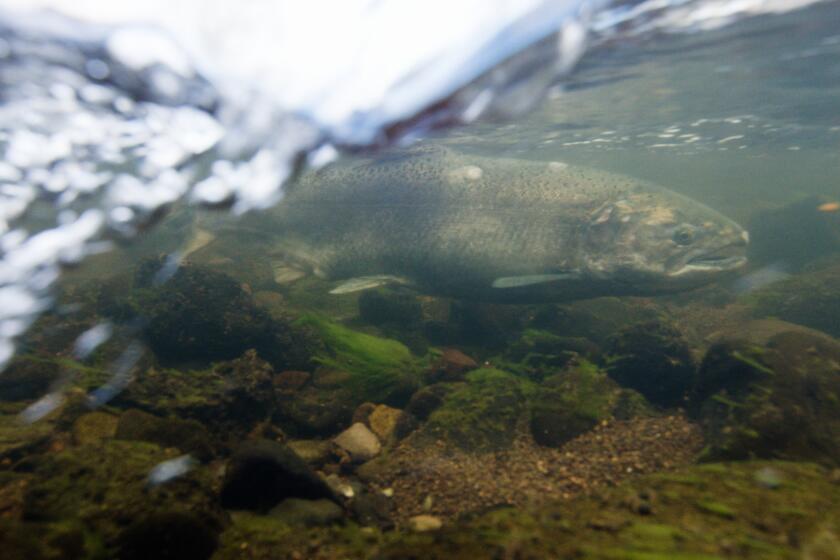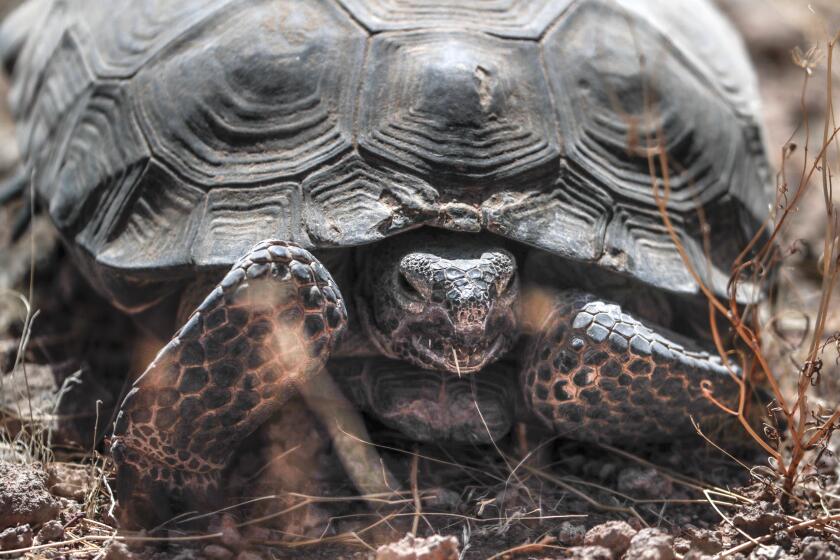Drawn to Scales
They’re scaly, cold and sometimes poisonous. Most of them would rather be left alone to eat rats and crickets than held or stroked.
But exotic snakes, lizards, turtles and frogs--known by collectors simply as “herps”--are slithering into the hearts of more and more pet owners these days, making their neighbors nervous and breeders rich.
“It’s the ‘Jurassic Park’ thing,” said Mike Walker, a high school computer teacher and herps hobbyist who, over the last six years, has turned his Costa Mesa house into a palace of lizards. “After the movie came out, everyone wanted their own little dinosaur.”
Between pythons, geckos, dragons, monitor lizards, skinks and a rare and creepy red tegu from Central America, Walker has about 25 prehistoric-looking reptiles, which he figures are worth about $40,000.
His little zoo is an extreme example of herp-mania, but Walker is far from alone.
At least 10 million people in the U.S. own some kind of reptile, and the number is growing fast, said Philippe de Vosjoli, president of the American Federation of Herpetoculturists and owner of the industry magazine Vivarium.
Like other enthusiasts, De Vosjoli insists reptiles are safe pets--as long as they’re handled responsibly. “If you compare them to other animals, it turns out they’re not very dangerous,” he said. “Look at dogs. They kill 14 or 15 people a year, and there are over a million dog bites in the United States every year.”
But De Vosjoli, who lives in Vista, conceded reptile-related injuries are on the rise, causing two or three deaths a year and generating sensational headlines even when the injuries are mild.
*
In just the last week, an escaped boa constrictor ate a pet Chihuahua in Los Angeles as the dog’s horrified owner watched, and a 10-year-old Anaheim boy’s pet python sunk its teeth into the boy’s hand, wrapped around his arm and began squeezing. Paramedics were forced to cut off the snake’s head.
Reptile collectors and breeders cringe when they hear such reports because they know a spate of new restrictions are bound to follow. Indeed, in the wake of the Chihuahua incident, Los Angeles City Councilman Hal Bernson proposed banning all pet snakes in the city unless owners have a special permit from the Department of Animal Control.
“When we see irresponsible, immature behavior, people keeping things for the wrong reasons, it disturbs us,” De Vosjoli said.
De Vosjoli and other federation members published guidelines for responsible reptile and snake ownership five years ago to head off incidents like the one involving Tanner Murabito, who was reaching into the 12-foot python’s cage with a bowl of water when he was attacked.
*
Rule No. 1: Children should not handle giant snakes like the python without adult supervision.
“This kind of snake is definitely not for minors,” De Vosjoli said. “You need a certain amount of experience and expertise to handle them. Unfortunately, they are sold in some shops without a book, without information, without guidelines. That’s why you’re seeing more incidents every year.”
To counter the scary trend, several wholesalers have cut back on sales of giant snakes and promoted smaller, more docile varieties. The increasingly popular ball python, for example, reaches only to about five feet and is tame by nature.
“We stopped selling anacondas last year, and after this year, we won’t sell any more Burmese pythons,” said Chris Estep, owner of Reptile Haven, a large wholesaler in Escondido. “We think it’s the responsible thing to do. Having one of those big snakes in the house is like keeping a loaded gun.”
*
Echo Swann is typical of the new breed of reptile owner. The former gas station manager began collecting lizards five years ago and became fascinated with colorful chameleons, bizarre-looking dragons from Australia and small, brightly striped king snakes.
“After a high-stress day at the station, sometimes all I wanted to do was go home and stare at my chameleons,” she said.
Last year, Swann turned her hobby into a business by opening a small Laguna Beach storefront called Leapin’ Lizards and stocking it with dozens of skittering, cold-blooded creatures from around the world. She also leases reptile displays to businesses, hosts “reptile parties” for children and boards pets for traveling owners.
In her cramped shop, cages are stacked from floor to ceiling, but many of her animals run free, leaping or slithering from hanging tree limbs and vines, and sometimes disappearing for weeks at a time. “Hmmm, I know I had a ball python around here somewhere,” she mentioned casually one afternoon as a few customers nervously checked the ceiling.
A vegetarian, Swann tosses baby rats and crickets to her critters without a second thought. And, like many collectors, she gushes with information, pulling out a globe or a book every few minutes to point out regions of origin or show native habitat.
Like many dealers, Swann has nothing but disdain for the green iguana--the most commonly kept reptile with about 1.6 million in captivity, according to De Vosjoli. They grow too large and can turn nasty as they grow old. Besides, they are so common.
Why not try something like a blue and black South American poison arrow frog instead? Or a frilly dragon from Australia with a jagged collar that flares when it’s mad? Or a blue-tongued skink from Australia--a truly prehistoric, slug-like creature with exceedingly short legs and a smooth roundish face?
“Skinks have a lot of personality,” she said. When asked how she knew, Swann reconsidered. “Actually, they’re nocturnal. They don’t do much of anything during the day.”
(BEGIN TEXT OF INFOBOX / INFOGRAPHIC)
Slippery When Pets
Typical prices for a sampling of reptiles:
Pet : Price range
South American poison arrow frog: $40-80
Australian bearded dragon: 60-80
Blue-tongued skink: 150-250
Chameleon: 50-300
Ball python: 40-150
Burmese python: 100-200
Monitor lizard: 40-1,500
Iguana: 12-20
King snake: 40-150
Source: Prehistoric Pets, Fountain Valley
More to Read
Sign up for Essential California
The most important California stories and recommendations in your inbox every morning.
You may occasionally receive promotional content from the Los Angeles Times.










